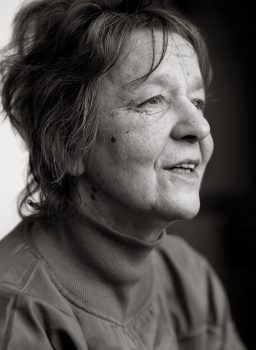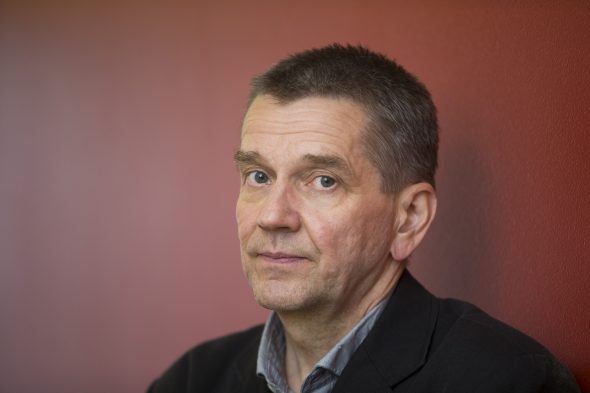Author: Markku Huotari
Business as usual
Issue 2/1994 | Archives online, Authors
The writing of Juha Vakkuri has never really belonged in the same category as Finnish agrarian prose or the tradition of prosaic realism. Vakkuri’s novels do, indeed, describe Finland and the country’s slow processes of change, but the changes are mirrored in other parts of the world: Europe, Africa and often elsewhere.
Vakkuri (born 1946) is head of programmes at the Finnish Broadcasting Company, and he has also worked as a development worker in Africa. His work on development projects and in the media appears in his novels as a jigsaw whose pieces, as they fit together, reveal to the reader a corner of the global village. Perhaps the clearest and, in the opinion of some critics, the best of Vakkuri’s international Finnish novels is Paratiisitango (‘Paradise tango’, 1993). In it, Vakkuri deals with situations familiar from the media world, in which the central problem is the conflict between power and morality. The book contains many frauds and their disclosures: nothing is as it seems. People who consider themselves moral commit crimes, and a victim of terrorism turns out himself to be a terrorist. Everything belongs to one and the same world, which the media both describe and conceal. More…
Beyond good and evil?
Issue 2/1987 | Archives online, Authors, Interviews

Esa Sariola. Kuva Irmeli Jung
Markku Huotari interviews Esa Sariola
A stylish restaurant in the Stock Exchange building in Helsinki. Esa Sariola and I order a businessmen’s lunch. We talk about hard-nosed success stories. About technocracy, casino economics.
About profit.
A steely-eyed businessman enters the room from the stock exchange and sees us two soft-talkers, even if we look like men, wasting time. The ruthless gambler bolts down his lunch and disappears to the upper floor again, where he is making money.
We remain.
We’re just talking.
And there’s no money accruing in our wallets.
All the same we have a grip on that investor. Esa Sariola has already laid siege to people like him in three books: Väärinkäsityksiä (‘Misconceptions’, 1983), a collection of short stories, and two novels: Rakas ystävä (‘Dear friend’, 1985) and Kuolemaani saakka (‘Until my dying day’, 1986). More…
A poet of the fresh air
Issue 2/1987 | Archives online, Authors, Interviews

Sirkka Turkka. Photo: Pertti Nisonen
Sirkka Turkka is interviewed by Markku Huotari
Snowflakes are already covering the forest, and an angry wind is blowing off Lake Lohjanjärvi. It is autumn, and in the courtyard, at the roots of a stunted rowan, is a lounge chair, its paint already peeling.
‘I’ve left the chair there because my mother used to sit in it and knit.’
I start at Sirkka Turkka’s comment. In my mind is her last-but-one volume of poetry, Vaikka on kesä (‘Although it’s summer’, 1983); its poems sound a contemporary lament, occasioned by her mother’s death.
‘There’s nothing made-up in my poetry,’ says Sirkka Turkka.
Landscape, nature, the circular path of life – all of these have left their wounds in Sirkka Turkka’s poetry. But as she writes in Tule takaisin, pikku Sheba (‘Come back, little Sheba’, 1986), winner of the Finlandia Prize 1987, ‘from the wounds life grows’. More…
Chill climates
Issue 2/1984 | Archives online, Authors, Interviews

Olli Jalonen. Photo: Pekka Nieminen.
Olli Jalonen was born in 1954 and lives in Hämeenlinna. His first work, a collection of short stories entitled Unien tausta (‘The background of dreams’, 1978) and two later novels, Sulkaturkki (‘Feather coat’, 1979) and Ilo ja häpeä (‘Joy and shame’, 1981) were reviewed with exceptional warmth by the critics. His latest novel, Hotelli eläville (‘Hotel for the living’, 1983) brought him a State Prize for Literature in 1984. The awarding committee commented that the novel is ‘a representative of that rare genre in Finnish literature, the grotesque novel’. Jalonen also received the ‘Spurs of Criticism’, the annual prize awarded by the Finnish Critics’ Association. The hotel for the living is the book’s ironic name for a nuclear shelter that is being quarried into the living rock of Finland; Jalonen sets up a situation that allows him to examine the crevices of his characters’ personalities. He studies their attitudes to life with cool satire – they live in the bleak climate of buying and selling, the struggle for power and material goods, the domination of others, and submission to their fates. Interview by Markku Huotari
‘Poetry in a world under threat’ was the headline for a survey of Finnish poetry by poet and critic Väinö Kirstina that appeared in the Tampere daily newspaper Aamulehti in 1981.
Two years later that headline is just as bitingly relevant. Only one alteration is necessary: to poetry must be added prose, for prose, too, is addressing itself to that future, difficult enough to imagine, in which the threat of nuclear war may involve Finland, living in the shadow of the super powers, in a conflict in which she wishes no part.
One of the scenes in Olli Jalonen’s novel Hotelli eläville (‘Hotel for the living’) is set in a nuclear shelter that is being built inside the living rock on which Helsinki stands. Even now the planners of that ‘shelter’ use the fear of other people to their own ends, and divide them into those who will be saved and those who will perish.
A sermon on the day of judgement? Cliche? Milking of a fashionable subject? More…
-
About the author
Journalist Markku Huotari (born 1953) is News Editor at Alma Media Corporation, Tampere.
© Writers and translators. Anyone wishing to make use of material published on this website should apply to the Editors.
